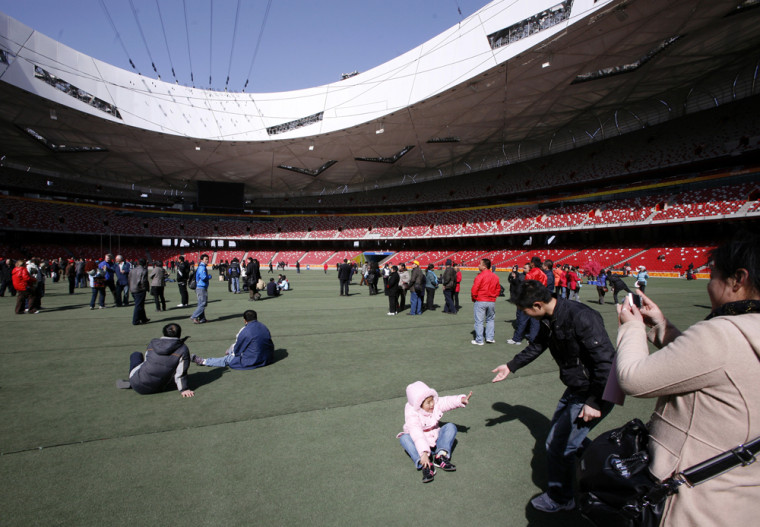For years, the Forbidden City and the Great Wall have been among the biggest tourist attractions in China. These days, the Bird's Nest is giving them a run for their money.
Nine months after the Beijing Summer Olympics, thousands of tourists from all over the country flock to the iconic stadium, venue of the dazzling Olympic opening and closing ceremonies, every day.
They pay the 50 yuan ($7) entrance fee to sit in the stands, get their picture taken on the central green and watch nothing.
"We didn't expect the Bird's Nest to become so popular among the Chinese people after the Olympic Games," Zhang Hengli, deputy general manager of the CITIC Consortium Stadium Operation Company, told Reuters.
"The large number of tourists is out of our expectation. Even though the weather has not been very good lately, and it is not holiday season, we still see between 20,000 and 30,000 tourists every day," said Zhang.
The landmark Bird's Nest National Stadium, cloaked in a mangle of steel girders giving it its name, has been rarely used after the Games, and with a price tag of over $500 million, many fear it could become the mother of all white elephants.
But Zhang said that despite the tough economy, revenue from entrance fees could cover the 70 million yuan maintenance costs a year and annual interest payments of up to 90 million yuan.
The Bird's Nest, which can now host 80,000 people, has become a showpiece of China's growing power and wealth, and the success of the Olympics has turned the structure into a source of national pride.
"I just feel our country is so great. It has built such a spectacular stadium. If there was no reform or opening up, or if we were still living in old China, we wouldn't have been able to achieve this," said 77-year-old Gou Daoguang, who travelled all the way from northeast China just to see the stadium.
Some visitors dress up in the Chinese national team's jumpsuits, don fake medals and hold a replica of the Olympic torch and have their photographs taken by professionals.
The tourists have helped take some of the pressure off the stadium's management to find a role for the structure.
In March, officials said they were planning to put on two shows a day — one with a sporting theme — to attract more visitors.
A performance of the opera Turandot is planned for the one-year anniversary of the opening of the Olympics on August 8 and permission is being sought for another large concert next month.
But so far, rows of empty seats are just fine for the crowds.
"I am so happy, because I have never been to an Olympic venue before," said 11-year-old Guo Remiao, who came with his classmates from central Hebei province. "It is so big and amazing."
